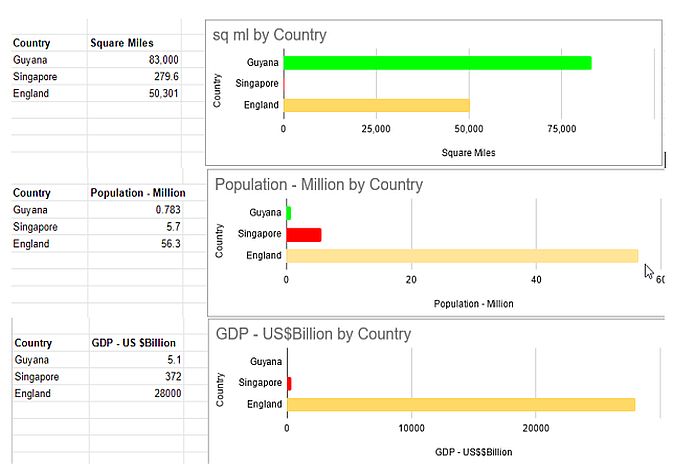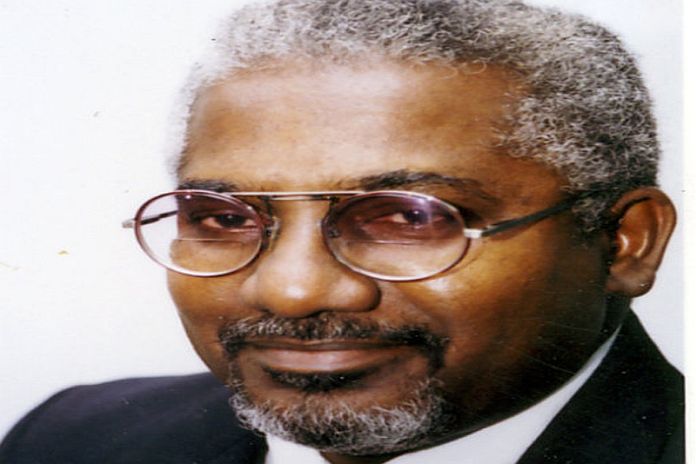By Wilberne Persaud
Guyana’s 78.3 thousand population occupies a landmass of 83,000 sq ml, compared to Singapore’s 279.6 sq ml with 5.7 million population and England’s 50,301 sq ml with population 56.3 million. Respectively, 2019 GDP numbers in current $US are $5.1 billion; $372 billion and $2.8 trillion.
Consider the charts below. Singapore almost disappears in the size category. Guyana actually does in GDP (income) category too small for scale.

These numbers/outcomes reflect much. Perhaps most important to note is this: the widespread notion of a country’s wealth being its physical resources, is completely bonkers. Fact is, a country’s true developmental resource is its people.
Look at it this way, regardless of bountiful fruit trees in the wild, consuming their fruit requires effort human labour. Even if indeed, machines do the harvesting, who created them? How were the technologies conceived and developed? People with imagination and ingenuity did. Additionally, a feature often overlooked in the modern technological age, is a government actually investing in basic research and/or rewarding private actors for so doing.
It is not generally grasped that Bill Gates, Steve Jobs and so many others never could have achieved the heights their ingenuity allowed, without the US government’s stupendous investment in basic research and technologies, often results of preparation for war. Think of the computing power and GPS location in our phones. The speed, kick and power Serena Williams and Roger Federer achieve in their serve would be unattainable but for materials technology developed for space exploration.
Economic development is a complex phenomenon involving human endeavour, organization, ofttimes luck good or bad and responses to these. So, for instance capitalism couldn’t have emerged and prospered absent the Joint Stock Company and legal personhood of the corporation, without medieval technology creating the harness, allowing land preparation for expanded farming and of course exploration leading to colonial exploitation that made the West Indies the original Jewels in the British Crown of Empire. Indeed, income from Barbados alone, dwarfed that of the North American colonies.
Guyana hemorrhaged people its true developmental resource to external migration since the 1970s resulting in significant loss of human capital. Should we compare this behavior of Guyanese to those tiny creatures to whom humanity owes so much the humble honey bee constantly seeking out the most abundant source of foraging and communicating it to her colony we’d need little mental effort to find explanatory factors. Foraging elsewhere has been decidedly superior for countless reasons. Folks working on population dynamics and policy refer to ‘push’ and ‘pull’ factors.
Additionally, research results strongly suggest non-refugee migrants tend to be positively selected with respect to their drive for success and a sensible, practical attitude to ‘risk’. The country’s loss is significant.
Guyana’s exports fit the category UNCTAD defines as a ‘CDDC’ or commodity-dependent developing country. No point quibbling about the term euphemism perhaps ‘developing’. What this means really is that the country’s major income-generating output is raw materials with minimal value added in the ‘food chain’ continued reliance on basic technologies. Ranked by value for the past decade these commodities are gold, rice, bauxite, sugar and timber. Oil and gas shall dwarf them all.
Accepting the implications of these ideas leads to one specific objective in an approach to management and use of the ‘windfall wealth’. This is a time-bound once in a lifetime opportunity for development. The age of renewable energy is upon us. Guyana must manage with care and a realistic time frame unimpeded by five-year political cycle swings. For this to happen consensus among the population is essential.
When Arthur Lewis advocated industrialisation of the British West Indies in his reporting to the Anglo-American Caribbean Commission three-quarters of a century ago, he highlighted the need for capital investment and entrepreneurship. The countries were poor with low savings rates. He advocated foreign capital work alongside invited entrepreneurs from whom locals would ‘learn the tricks of the trade’. In those days, infant industry protection was allowed in the international system. His plan required production for export and NOT import substitution for the local market which proliferated; proving to be a disaster.
Today, oil revenues provide the ‘investment capital’ part of the solution. The next requirements must follow good governance, absence of corruption and entrepreneurship. How foster these?
A prerequisite for this is both constitutional and electoral reform. Why? A truly vibrant economy absolutely requires societal cohesion and abandonment of the ‘US vs. THEM’ mentality.
With such a small population, it might be thought the democratic process would be relatively easy to entrench. The current representational system, however, hinders this. Having a block of candidates, means voters choose a political party. This exacerbates the racial divide and dilutes if not obliterates accountability of representatives to their communities. The notion ‘all politics is local’ dies as ordinary citizens have little input or influence on policies germane to their everyday lives.
Hard as this is to achieve, the only true, if not guaranteed path to success is what we referred to as the dire need for institutional strengthening of ALL aspects of governance and its structures — a process required to achieve responsibility and concomitant accountability.
Happily, Guyanese civil society organisations are engaged. As the Chronicle reports: “NEWLY formed civil society group, Electoral Reform Guyana (ERG), will be engaging Guyanese in an attempt to arrive at a national consensus, as part of efforts to drive electoral reform in Guyana.”
Informative and very useful pieces of work discuss major issues that need to be addressed. One such has been in existence since 2017 providing sensible bases for discussion.
Also, Fitzgerald Yaw’s 2019 work: “Sustainable Development for all Guyanese: The Imperative of Governance Reform” traces in a well-organized way, the process that has in a sense, resulted in what the ERG refers to as Guyana’s “distressed” political environment.
In the final analysis Guyana’s objective must be this: Reduce ‘PUSH’ factors, increase ‘PULL’ factors at home. This thrust once recognized as ongoing, shall generate positive perception and attitudes in both contemplation and pursuit of sustainable development.
Central to achieving this is the outcome of the current debate surrounding Local Content Policy (LCP). The issues meant to be addressed by LCP are anything but new. Indeed, in a generic sense, variants emerged in the post-colonial era beginning with independence movements as Britain, shortly after WW II realized it could no longer maintain its colonies despite Churchill’s boast to the gathering at The Lord Mayor’s Luncheon, Mansion House: “I have not become the King’s First Minister in order to preside over the liquidation of the British Empire.” He didn’t. Yet, liquidation had commenced.
Basically, these policies all attempt to retain value locally and thus secure economic development. Governments instituted trade, commerce, investment, taxation arrangements etc; effectively the entire quiver of regulatory devices aimed wherever possible, at benefitting from foreign investment. This is a long story but in closing one caution should be borne in mind: the lived Nigerian experience offers clear markings of dangers posed by corruption in implementation.
The 52 page “Local Content Policy for the Development of Guyana’s Petroleum Economy”, Revised Draft – February 2021 sets out a remarkably ambitious set of desiderata. Admirable as these are, big questions remain. Embedding targets for Guyanese nationals’ participation in esoteric technical aspects of offshore oil and gas extraction presumes skills which currently do not exist.
Creating what is effectively government veto-power over contractors, suppliers and personnel in the industry and the requirement that international companies hire contractors and workers exclusively through government lists is fraught with dangers. Management of these regulatory devices require unique skills should we preferably deem it wisdom? More questions exist than answers specified. * GDP numbers for England refer to UK.
Related: An approach to healing Guyana’s socio-political and economic ills: Part 1






